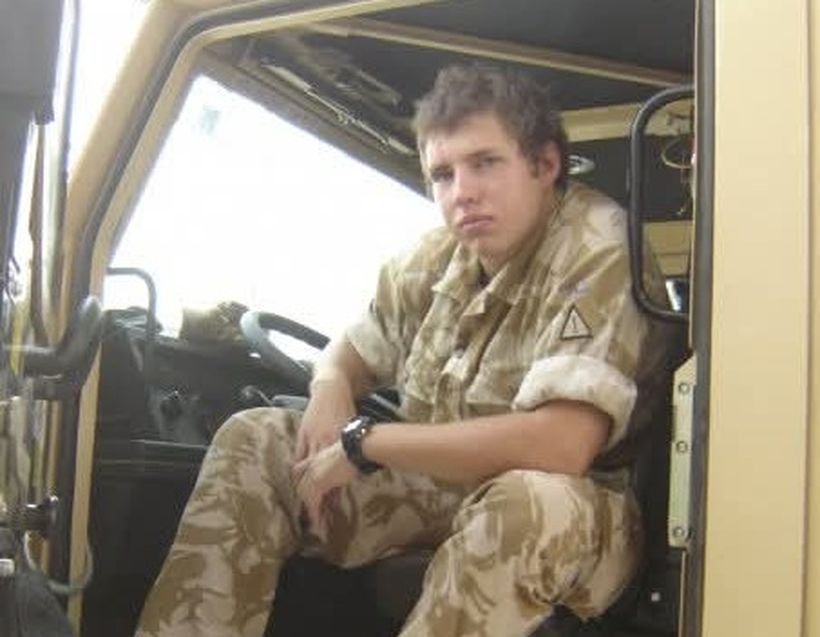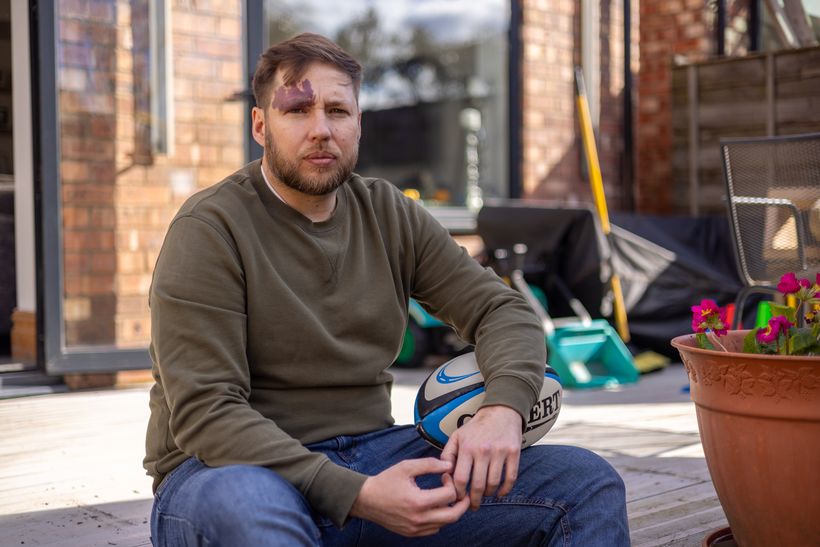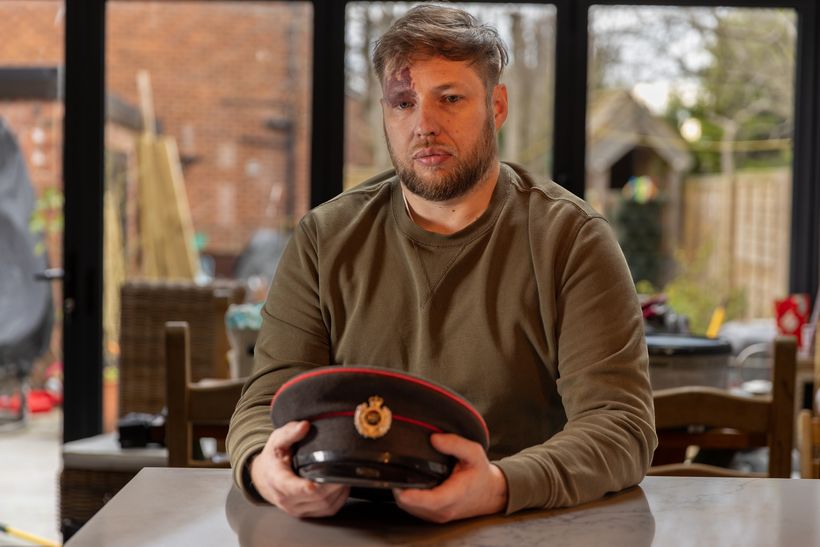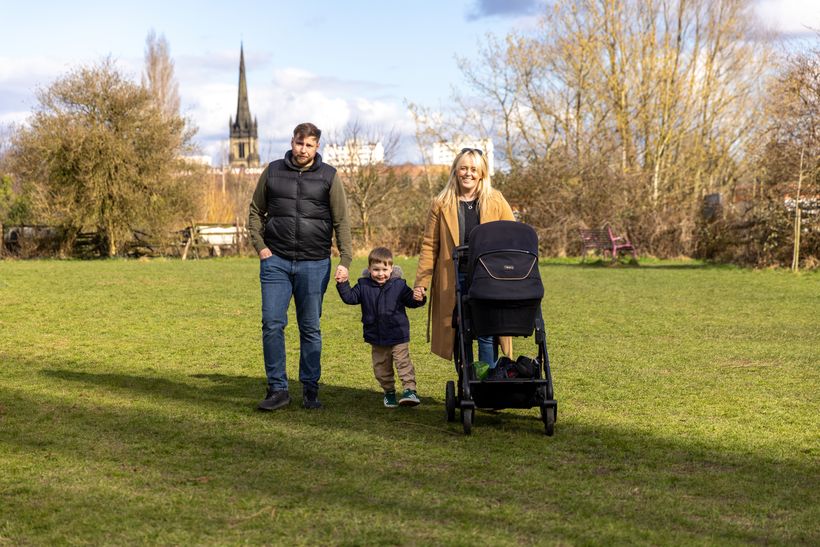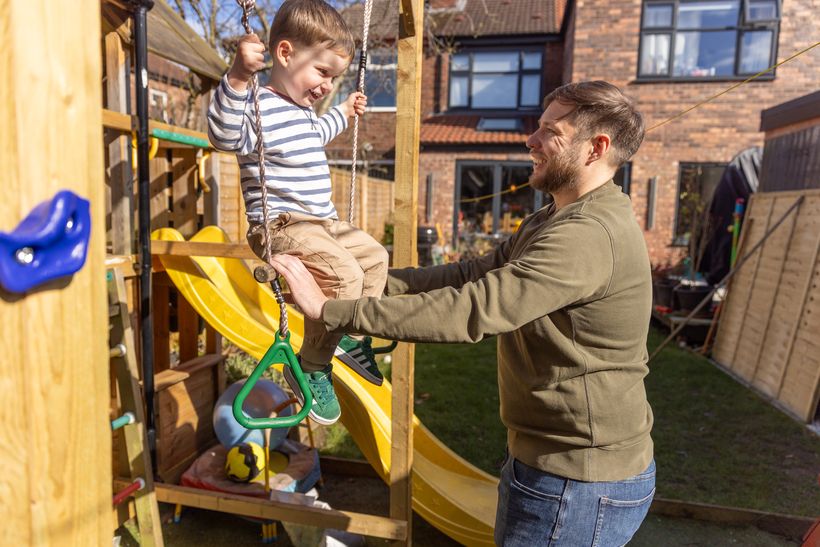Craig loved Army life and felt like an ‘invincible soldier’. Being in the military was all he'd ever wanted to do.
He spent 15 years as a Royal Engineer and achieved the rank of Lance Corporal.
“As a child, I used to say to my mum and dad ‘I don’t really need school, because I'll be going in the Army.’ I didn't ever want to do anything else. So, it was a kick in the teeth, to be told I couldn't do it any longer.”
A rugby match and a missed diagnosis
Problems began for Craig when he broke his wrist playing rugby for his regiment in a competition with the Army.
The injury was initially missed. As Craig continued to work and exercise, it got worse until one day it completely gave way. Further tests revealed it had become a serious and complex break.
After major reconstruction surgery, Craig was sent home to recover.
Because of complications, the recovery process took longer than expected. Further surgery was required.
‘I was no longer invincible, I was broken’
"For 14 to 15 months, I was left completely isolated at home. I barely spoke to my unit. I was forgotten.
“Before the injury I was a ‘can do anything invincible soldier’. After the injury I couldn’t even do basic household and garden tasks.
“I felt useless and a burden to my wife who had to pick up all the jobs I would normally do, plus all the driving."
Receiving little support with his recovery, Craig was then faced with the prospect of being medically discharged from the Army.
“I thought I’d recover and return to work, but then they said I had to go to a medical board. I was still having operations and on a high dose of morphine. After the time alone at home, they asked if I still felt like a soldier. I said, ‘I don’t think I am one anymore – I haven’t been to a military establishment for two years.’ Reflecting back, it felt like a leading question, when ultimately they made the decision for me.”
‘I felt like I’d never existed’
"I was medically discharged in November 2018. By the next morning, I wasn’t a soldier anymore. Just like that.
"When I handed back my kit, most people had moved on. Very few people in the squadron knew who I was. I felt like I’d never existed.
“The entire discharge process made me feel isolated, unwanted and unimportant after giving 15 good years to the Army.
five people are medically discharged from the Armed Forces each day due to illness or injury*
The reality of medical discharge
Like Craig, many people find the sudden end to their military career and having to adjust to civilian life a shock.
"I was given just three months to prepare for my military career being over – when most people leaving the Armed Forces get 12 months. I was still receiving treatment, still in pain, and had no idea what came next.
“It took months for my first Army pension payment to come through. Without my family, I don’t know what I would have done. I can see how so many veterans end up homeless.”
‘Help for Heroes were there when I needed them’
As well as the pain from his wrist injury, Craig was suffering with post-traumatic stress disorder (PTSD) from his time in combat which was exacerbated by the pain and circumstances.
Craig said: “I had a diagnosis from the military for PTSD. I was referred to the NHS, but the NHS is so overwhelmed with mental health issues.
“So when I left the military I had four sessions with the NHS over the course of six months, but it's people like Help for Heroes I've had the most support from.
“I’ve received support from the Charity for my injury in the form of pain management information, occupational health support and a specially designed splint. I also have regular treatment with the Hidden Wounds mental health team for PTSD.”
Help for Heroes’ Hidden Wounds service provides tailored counselling, therapy and psychological education to veterans and their families and can help people with a wide variety of mental health conditions.
Craig says that his experiences leaving the Army left him feeling bitter and angry towards the institution he served for 15 years, something he’s addressed through counselling and courses with Help for Heroes.
“I’ve benefited from courses like You, Me and Anger and have been referred to the Knowing Your Pain course. My experience so far with these courses has been really positive and helped equip me with practical advice and coping mechanisms that are tailored to military personnel.
“Help for Heroes are always there when I need them. But charities shouldn't have to pick up the pieces after you've given the best part of your adult life to something.”
Craig has since retrained as an electrical engineer.
“I still have concerns the injury could prevent me from being able to work with my hands and putting me in a position of having to reinvent myself for a third time.”
Even now, years later, I still feel like I was let down. The way they discharge injured soldiers needs to change. No one should be made to feel like they don’t matter.
Veteran
‘His sense of identity was stripped away’
The medical discharge was also tough for Craig’s wife Georgina. The couple have two young children together.
She said: “Craig’s medical discharge was and still is an incredibly emotional rollercoaster. Firstly to watch the person you love in pain is awful, particularly when there is very little you can do to help. To then watch them go through the uncertainty and lose the one job they have ever wanted is horrific. His sense of identity was stripped away in a matter of months with very little support for what was to come next.
“There was then a significant amount of pressure on me to support him through the pain, the transition to civvy street and provide for our household."
“The rug can quite literally be pulled from underneath an individual or family with devastating consequences at a time when service personnel are at their most vulnerable. The process and system must change to help keep families together and off the streets.
“Craig has had to rebuild everything. His mental state, his physical ability, who he is as a person, his career. The Army was a huge influence on him as a person and his lifestyle. He was lost for such a long time without any kind of purpose or sense of direction. I am incredibly proud of how he has persevered and fought for himself and our family.”
‘Don’t be afraid to ask for help’
Craig has this advice for anyone serving who is facing the end of their military career.
“Make sure you have a good support network around you that you can rely on. I wouldn’t be where I am today without mine. Make a plan A and B just in case.
“Reach out to Help for Heroes or other charities and see what support is available. I’m only in the position I am in now because my support network pushed me to take the initiative or helped me to find support in other areas where the military lacked.
“Most importantly don’t be afraid to ask for help. It might feel hard to do so, but everyone needs a little support from time to time.”
*MOD: Annual Medical Discharges in the UK Regular Armed Forces (2024)
Updated on



